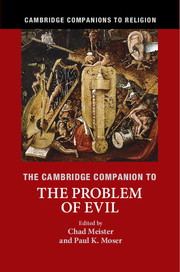Description
The Cambridge Companion to the Problem of Evil
Cambridge Companions to Religion Series
Coordinators: Meister Chad, Moser Paul K.
This Companion offers a state-of-the-art contribution by providing critical analyses of and creative insights on the problem of evil.
Language: English
Subject for The Cambridge Companion to the Problem of Evil:
The Cambridge Companion to the Problem of Evil
Publication date: 06-2017
Support: Print on demand
Publication date: 06-2017
Support: Print on demand
The Cambridge Companion to the Problem of Evil
Publication date: 06-2017
282 p. · 15.7x23.6 cm · Hardback
Publication date: 06-2017
282 p. · 15.7x23.6 cm · Hardback
Description
/li>Contents
/li>Biography
/li>
For many centuries philosophers have been discussing the problem of evil - one of the greatest problems of intellectual history. There are many facets to the problem, and for students and scholars unfamiliar with the vast literature on the subject, grasping the main issues can be a daunting task. This Companion provides a stimulating introduction to the problem of evil. More than an introduction to the subject, it is a state-of-the-art contribution to the field which provides critical analyses of and creative insights on this longstanding problem. Fresh themes in the book include evil and the meaning of life, beauty and evil, evil and cosmic evolution, and anti-theodicy. Evil is discussed from the perspectives of the major monotheistic religions, agnosticism, and atheism. Written by leading scholars in clear and accessible prose, this book is an ideal companion for undergraduate and graduate students, teachers, and scholars across the disciplines.
Part I. Conceptual Issues and Controversies: 1. Evil and the meaning of life John Cottingham; 2. Beauty and the problem of evil Charles Taliaferro; 3. Logical arguments from evil and free will defences Graham Oppy; 4. God, evil, and the nature of light Paul Draper; 5. Skeptical theism Timothy Perrine and Stephen Wykstra; 6. Evil, hiddenness, and atheism J. L. Shellenberg; 7. Anti-theodicy N. N. Trakakis; Part II. Interdisciplinary Issues: 8. Cosmic evolution and evil Christopher Southgate; 9. Ancient Near Eastern perspectives on evil and terror Margo Kitts; 10. Judaism and the problem of evil Lenn Goodman; 11. Christianity, atonement, and evil Paul S. Fiddes; 12. Islam and the problem of evil Timothy Winter; 13. Naturalism, evil, and God Michael Ruse.
Chad Meister is Professor of Philosophy and Theology at Bethel College, Indiana, where he received the Professor of the Year award for teaching excellence. He is the author of Evil: A Guide for the Perplexed, 2nd edition (forthcoming), and co-editor of Five Views on the Problem of Evil (forthcoming), The History of Evil (six volumes, forthcoming), and the award-winning God Is Great, God Is Good (2009).
Paul Moser is Professor of Philosophy at Loyola University, Chicago. He is the author of The God Relationship (Cambridge, forthcoming) and the award-winning book The Elusive God: Reorienting Religious Epistemology (Cambridge, 2002). Other publications include The Evidence for God (Cambridge, 2009), The Severity of God (Cambridge, 2013), Knowledge and Evidence (Cambridge, 1991), Philosophy after Objectivity (1993), and Theory of Knowledge (1997). He is the editor and co-editor of Jesus and Philosophy (Cambridge, 2008), The Oxford Handbook of Epistemology (2005), and The Wisdom of the Christian Faith (Cambridge, 2012). He is the co-editor, with Chad Meister, of the Cambridge Studies in Religion, Philosophy, and Society series.
Paul Moser is Professor of Philosophy at Loyola University, Chicago. He is the author of The God Relationship (Cambridge, forthcoming) and the award-winning book The Elusive God: Reorienting Religious Epistemology (Cambridge, 2002). Other publications include The Evidence for God (Cambridge, 2009), The Severity of God (Cambridge, 2013), Knowledge and Evidence (Cambridge, 1991), Philosophy after Objectivity (1993), and Theory of Knowledge (1997). He is the editor and co-editor of Jesus and Philosophy (Cambridge, 2008), The Oxford Handbook of Epistemology (2005), and The Wisdom of the Christian Faith (Cambridge, 2012). He is the co-editor, with Chad Meister, of the Cambridge Studies in Religion, Philosophy, and Society series.
© 2024 LAVOISIER S.A.S.




